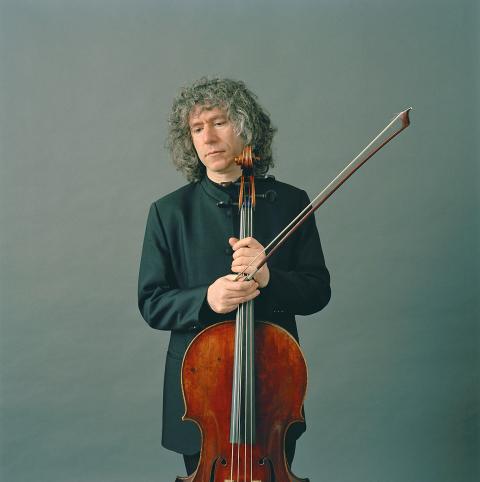It’s always nice to see former National Symphony Orchestra (國家交響樂團, NSO) music director Chien Wen-pin (簡文彬) back in Taiwan. This weekend he’s conducting two concerts with his old orchestra — tomorrow evening in Kaohsiung, and on Sunday afternoon in Taipei, both events with the same program.
But the star of these concerts will undoubtedly be the British cellist Steven Isserlis. His recording of Bach’s six Cello Suites (which he controversially believes follow the life of Jesus) won first place in the Instrumental section of the 2007 awards in Gramophone magazine. He’s played at the Salzburg Festival, the BBC Proms, the Aldeburgh Festival and many more, and performs on a Stradivarius cello dating from 1726. The work he’ll be playing in Taiwan will be Shostakovich’s first cello concerto, much the more frequently performed of this composer’s two concertos for the instrument. The NSO will then play Strauss’ magnificent tone poem Ein Heldenleben (A Hero’s Life) after the interval.
Shostakovich’s concerto dates from 1959. It contains four movements rather than the usual three — the extra one is a cadenza inserted after the ruminative second movement. It was premiered by Rostropovich and since then has been performed by just about every cellist of note.

Photo courtesy of NSO
Strauss’ famous Ein Heldenleben was first performed in 1899 and depicts his own life. Strauss probably only considered himself a hero in his battle against hostile critics, cleverly depicted here, with their incomprehensible cackling, in the second of the works’ six interconnected sections. At this time, Strauss was essentially the enfant terrible of the classical scene, and though later in life he came to be seen by would-be progressives as the model of domestic self-satisfaction, even here he shows his quieter, devoted side in his depiction of the hero’s beloved (Strauss himself had recently married). But with its contrasting sections and final heartfelt apotheosis, Ein Heldenleben is one of the finest vehicles for orchestral versatility and color ever penned.
The composer Lee Tzyy-sheng (李子聲) has unfortunately not managed to finish his new composition, which was due to be premiered by the NSO this weekend, so in its place the orchestra will play Hsu Tsang-Houei’s (許常惠) popular 1964 ballet music The Moon Goddess Flees for the Moon (嫦娥奔月) as its opening item.
The National Symphony Orchestra performs under Chien Wen-pin tomorrow at Sun Yat-sen Hall, National Sun Yat-sen University (國立中山大學逸仙館), 70 Lianhai Rd, Greater Kaohsiung (高雄市蓮海路70號), at 7:30pm, and in Taipei’s National Concert Hall on Sunday at 2:30pm. Tickets are NT$400 to NT$1,000 in Kaohsiung and NT$400 to N$2,500 in Taipei, available from the NTCH box office, online at www.artsticket.com.tw and by calling (02) 3393-9888.

Behind a car repair business on a nondescript Thai street are the cherished pets of a rising TikTok animal influencer: two lions and a 200-kilogram lion-tiger hybrid called “Big George.” Lion ownership is legal in Thailand, and Tharnuwarht Plengkemratch is an enthusiastic advocate, posting updates on his feline companions to nearly three million followers. “They’re playful and affectionate, just like dogs or cats,” he said from inside their cage complex at his home in the northern city of Chiang Mai. Thailand’s captive lion population has exploded in recent years, with nearly 500 registered in zoos, breeding farms, petting cafes and homes. Experts warn the

The unexpected collapse of the recall campaigns is being viewed through many lenses, most of them skewed and self-absorbed. The international media unsurprisingly focuses on what they perceive as the message that Taiwanese voters were sending in the failure of the mass recall, especially to China, the US and to friendly Western nations. This made some sense prior to early last month. One of the main arguments used by recall campaigners for recalling Chinese Nationalist Party (KMT) lawmakers was that they were too pro-China, and by extension not to be trusted with defending the nation. Also by extension, that argument could be

Aug. 4 to Aug. 10 When Coca-Cola finally pushed its way into Taiwan’s market in 1968, it allegedly vowed to wipe out its major domestic rival Hey Song within five years. But Hey Song, which began as a manual operation in a family cow shed in 1925, had proven its resilience, surviving numerous setbacks — including the loss of autonomy and nearly all its assets due to the Japanese colonial government’s wartime economic policy. By the 1960s, Hey Song had risen to the top of Taiwan’s beverage industry. This success was driven not only by president Chang Wen-chi’s

Last week, on the heels of the recall election that turned out so badly for Taiwan, came the news that US President Donald Trump had blocked the transit of President William Lai (賴清德) through the US on his way to Latin America. A few days later the international media reported that in June a scheduled visit by Minister of National Defense Wellington Koo (顧立雄) for high level meetings was canceled by the US after China’s President Xi Jinping (習近平) asked Trump to curb US engagement with Taiwan during a June phone call. The cancellation of Lai’s transit was a gaudy